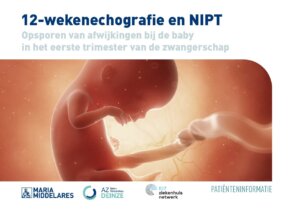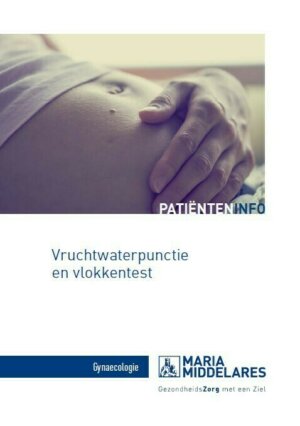
Prenatal appointments and testing for abnormalities
Prenatal appointments
Prenatal appointmentsBelow is a schematic overview of the prenatal appointment schedule. At every appointment, various checks are performed.
| Around 8 weeks | First pregnancy appointment |
| Around 12 weeks | First pregnancy scan |
| Around 16 weeks | |
| Around 20 weeks | Second pregnancy scan |
| Around 24 weeks | Diabetes test |
| Around 28 weeks | |
| Around 32 weeks | Third pregnancy scan |
| Around 36 weeks | GBS screening |
| Around 38 weeks | |
| Around 40 weeks |
Scans during your pregnancy
Scans during your pregnancyFor each pregnancy, three ultrasound scans will be reimbursed, one for each trimester. Various aspects are checked during these ultrasound scans:
12 weeks of pregnancy | 18-22 weeks of pregnancy | 32 weeks of pregnancy |
|---|---|---|
| Growth and development of the child | Extensive examination of all body parts of the baby | Checking growth and position of the baby and the amniotic fluid volume |
| Nuchal translucency measurement and NIPT: screening for potential disorders such as Down’s Syndrome. | Screening for serious anomalies |
Chromosomes and chromosomal abnormalities
Chromosomes and chromosomal abnormalitiesWhat are chromosomes?
Chromosomes are the carriers of our genetic material. There are 46 chromosomes in each cell of our body. These chromosomes are arranged in pairs, with a total of 23 pairs. In each pair, one chromosome comes from the mother and one from the father. The first 22 pairs of chromosomes are the same in men and women. Only the 23rd pair, the sex chromosomes, is different in men and women: a woman has two X chromosomes, a man has one X and one Y chromosome.
The reproductive cells, especially the egg cells and the sperm cells, are produced after a special division (meiosis) and contain only 23 chromosomes. When an egg cell is fertilised by a sperm cell, a new cell (the first fertilised egg cell) with 46 chromosomes is produced. Sometimes something goes wrong during this division process. If this happens, the baby may have one too many (trisomy) or one too few (monosomy) chromosomes. Usually the pregnancy ends spontaneously in a miscarriage before the twelfth week. However, it is also possible that no miscarriage occurs, but that a baby is born with a chromosomal abnormality.
Other problems can also occur during fertilisation, resulting in there being too many or too little smaller pieces of chromosomes in the foetus.
Screening for anomalies
Screening for anomaliesThe vast majority of children that are born here are completely healthy. Are there any congenital abnormalities in your own close family? Make sure you let your physician know as soon as possible, and preferably before you intend to become pregnant. That way, we can investigate whether it will be useful to take certain steps during your pregnancy. However, be aware that although medical science has made great progress in screening for anomalies, no test exists that gives you a 100% guarantee of a healthy child.
We carry out the following tests to screen for potential anomalies:
- Nuchal translucency measurement - around 12 weeks of pregnancy
- NIPT - around 12 weeks of pregnancy
In the leaflet below, you can read everything about nuchal translucency measurements and NIPT:
Only available in Dutch:

12 weken echografie en NIPT
DownloadThe NIPT or combined-screening test only provides an estimated increased risk of abnormalities, not a definitive result. If an abnormal result is found in a nuchal translucency measurement or NIPT, this always requires confirmation through one of the tests below. These tests do provide 100% certainty. After an abnormal NIPT result, we always carry out an amniocentesis, not chorionic villus sampling.
- Amniocentesis - around 15 weeks of pregnancy
- Chorionic villus sampling - from 11-12 weeks of pregnancy
In the leaflet below, you can read more about amniocentesis and chorionic villus sampling:
Only available in Dutch:

Vruchtwaterpunctie en vlokkentest
DownloadSomething wrong or unclear on this page? Report it.



